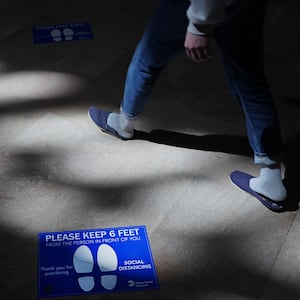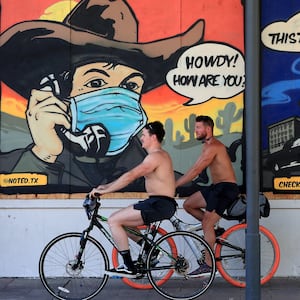During a tense exchange on Capitol Hill, Sen. Rand Paul (R-KY) on Tuesday blasted the nation’s top public health experts for their lack of optimism during the unprecedented, highly lethal, and surging coronavirus pandemic.
“We need to not be so presumptuous that we know everything,” the Kentucky Republican said during an impassioned plea to the U.S. Senate Committee on Health, Education, Labor, and Pensions about the need for schools to reopen. He went on to call America’s public health community “fatally” arrogant.
“Perhaps our planners might think twice before they weigh in on every subject,” Paul added. “Perhaps our government experts might hold their tongue before expressing their opinion.”
Paul specifically berated Dr. Anthony Fauci—the public face of the White House’s coronavirus response and the director of the National Institute of Allergy and Infectious Diseases—for his recent statements on spectator sports, herd immunity, and other subjects. Though Fauci had couched his words in caveats, he said that “it would be very hard to see how football is able to be played this fall” and that, even with a working vaccine, herd immunity might be difficult to accomplish if Americans aren’t willing to take it.
But Paul said such statements have caused “undue fear” in pockets of the country and cautioned the public not to trust the words of top infectious disease professionals in the country, saying, “We shouldn’t presume that a group of experts somehow knows what’s best for everyone.”
“We just need more optimism,” Paul added.
In response, Fauci told the committee that his words often get twisted in the media and that, “I feel very strongly we need to do whatever we can to get the children back to school.”
But minutes later, he also said that the country could begin seeing 100,000 new cases a day “if things don’t turn around,” telling the committee, “It could get very bad.”
Fauci echoed a slew of experts and officials nationwide, noting he was “quite concerned about what we are seeing evolve right now in several states,” citing rising coronavirus case numbers in Florida, Texas, California, and Arizona.
Dozens of states have seen record-breaking rises in case counts in recent weeks, with Florida, Texas, and Arizona experiencing some of the worst trends. On Friday, the U.S. reported a new daily record of 40,000 overnight coronavirus cases. As of Tuesday, there were 2,683,000 confirmed cases of the virus across the country. More than 129,544 Americans have died.
“We’ve got to make sure when states start to try and open again, they need to follow the guidelines that have been very carefully laid out with regard to [reopening] checkpoints,” he continued, admitting that “maybe” some states reopened “too quickly” by “skipping checkpoints.”
“But even in states in which the leadership, in the form of the governors and mayors, did it right with the right recommendations,” individual behavior was often problematic, explained Fauci, noting the photographs and videos recorded in recent weeks of people in crowded bars without masks.
“If we’re going to contain this, we’re going to contain it together,” said Fauci.
The hearing came as senators weighed another stimulus package to help mitigate the economic devastation caused by nationwide shutdowns over the virus.
Sen. Bernie Sanders (I-VT) asked the experts about corporate decisions, as well. American Airlines announced this week that it plans to sell flights to capacity again, beginning on July 1. When Sanders asked whether that move contradicts guidelines by the Centers for Disease Control and Prevention, the agency’s director, Robert Redfield, responded, “We don’t think it’s the right message.”
Despite the recent surges and Paul’s apparent anger at the demeanor of the officials at Tuesday’s hearing, Dr. Stephen Hahn, commissioner of the Food and Drug Administration, testified he was “optimistic” that there would be therapeutic treatments in the fall. However, on that same score, Fauci said there’s “no guarantee” the U.S. would ever develop a “safe and effective” vaccine.
Fauci did note that he was “aspirationally hopeful” that one could reach the public by next year.







